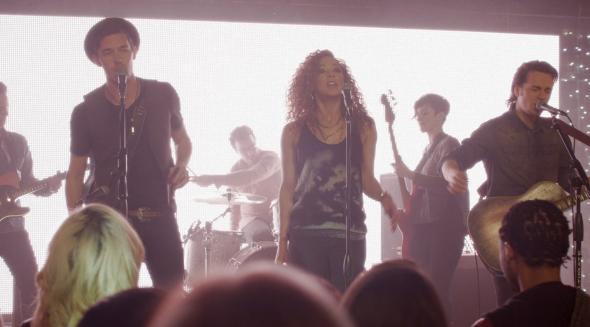On last week’s episode of Nashville, “Guilty Street,” Avery (Jonathan Jackson), Gunnar (Sam Palladio), and Zoey (Chaley Rose) get up on an elaborately lighted stage to play one of their first real gigs. They sing three-part harmonies while Avery shreds on guitar and Zoey … shakes a tambourine. Gunnar doesn’t even play his guitar, but it remains firmly fixed to his body, a reminder of his instrumental prowess. As is typical on Nashville, the woman, tambourine-shaking aside, only sings.
There are some minor exceptions to this basic rule. Rayna (Connie Britton) has two daughters who often perform together, with the eldest, Maddie, strumming an acoustic guitar. (The daughters are played by real-life sisters who were cast on the strength of their popular YouTube duets.) But those are girls, not women. Scarlett (Clare Bowen) occasionally plays the banjo while she sings, but only occasionally. If you squint, you can see a female bass player in Avery, Gunnar, and Zoey’s band, though she stays in the background (and looks more alt-rock than alt-country—the alt-rock bass-playing girl is another archetype). In this week’s episode, “We’ve Got Things to Do,” Layla (Aubrey Peeples) briefly plays a shiny red guitar, the first time she’s shown with the instrument. But the scene is short, and her performance is merely the backdrop for a conversation between her manager and her boyfriend, Will (Chris Carmack).
For the most part, the principal female musicians on the show—Rayna Jaymes, the Faith Hill-esque reigning Queen of Nashville; Scarlett O’Connor, the doe-eyed ingénue; Zoey Dalton, the frustrated upstart; Layla Grant, the well-scrubbed new arrival; and Juliette Barnes (Hayden Panettiere), the former teen pop star struggling to be taken seriously as a country singer—are purely singers.
The men, meanwhile, invariably have a guitar strapped on when they perform. Gunnar even hops behind the drum kit to accompany veteran session musician Deacon Claybourne, who plays both guitar and piano. Is Nashville worried that a guitar will get in the way of its female stars’ pretty dresses? Is this a gaping oversight on the part of its writers, or just an accurate if slightly depressing reflection of the country music scene?
Probably a bit of both. Consider the major female players in country music. While Carrie Underwood reportedly knows piano and guitar, she doesn’t play an instrument while performing. Neither does Kellie Pickler. Miranda Lambert occasionally plays guitar onstage, but more often she doesn’t. Taylor Swift does accompany herself frequently, as do Kacey Musgraves and Brandy Clark, two recent country breakouts. But, as Slate music critic Carl Wilson pointed out to me, Swift, Musgraves, and Clark “frame themselves more as singer-songwriters than most country stars, and being seen playing their own instruments helps underline the idea that they’re auteurs. That’s much less true for more conventional singing stars.”
The as-yet-unnamed trio formed by Zoey, Gunnar, and Avery looks a lot like the real-life group Gloriana, which features brothers Tom and Mike Gossin on guitar and vocals and Rachel Reinert on vocals only, even though Reiner has played guitar since she was a kid. Similarly, Little Big Town’s four-part harmonies come courtesy of two men who play guitar and sing and two women who only sing. Again, there are exceptions: Kimberly Perry plays guitar and piano in addition to singing as part of the Band Perry. Nashville veterans Pam Tillis and Lorrie Morgan both sing and strum. But these women are unusual in contemporary country.
“While it’s true that most singers can and do play an instrument,” Wilson says, “there is a real-life gender divide in country and in pop in general on this score.” New York magazine pop critic Jody Rosen agrees: “Playing guitar while singing codes as ever-so-slightly earthy and even ‘masculine’ … in, (if you will) the semiotics of country performance. So it makes sense that a certain kind of female star steers clear of the guitar.” It’s not only the guitar that’s gender-coded: Tambourine-shaking Zoey is just one in a long lineage of female singer/tambourine players, from Linda Ronstadt to Tracy Partridge to Stevie Nicks. (Women have been playing the tambourine for centuries—millennia, even.) The rise of Girls Rock Camps, Wilson says, reflects a strong desire to defy the sexist assumption that women are primarily vocalists who need men to provide the rest of the music.
So Nashville is largely just showing it like it is. But it would be nice if the series engaged more seriously with country music’s gender dynamics—so far, it’s only really addressed the issue through the gay-but-closeted rising star Will Lexington (Chris Carmack). Nashville was created by Callie Khouri, who wrote Thelma & Louise, so its failure to do more with this rich subject is puzzling. It’s an ABC series, which means that it’s geared towards a much broader audience than it would be if it were on, say, Showtime; perhaps this explains why the show is reluctant to wade into the subject of sexism. (Rayna has started her own label, but the challenges she faces as a budding music exec do not, so far, include gender discrimination.)
Maybe Nashville just wants to faithfully represent the musical gender divide of its titular city. But the show hasn’t exactly been a beacon of realism, so why let that get in the way?
